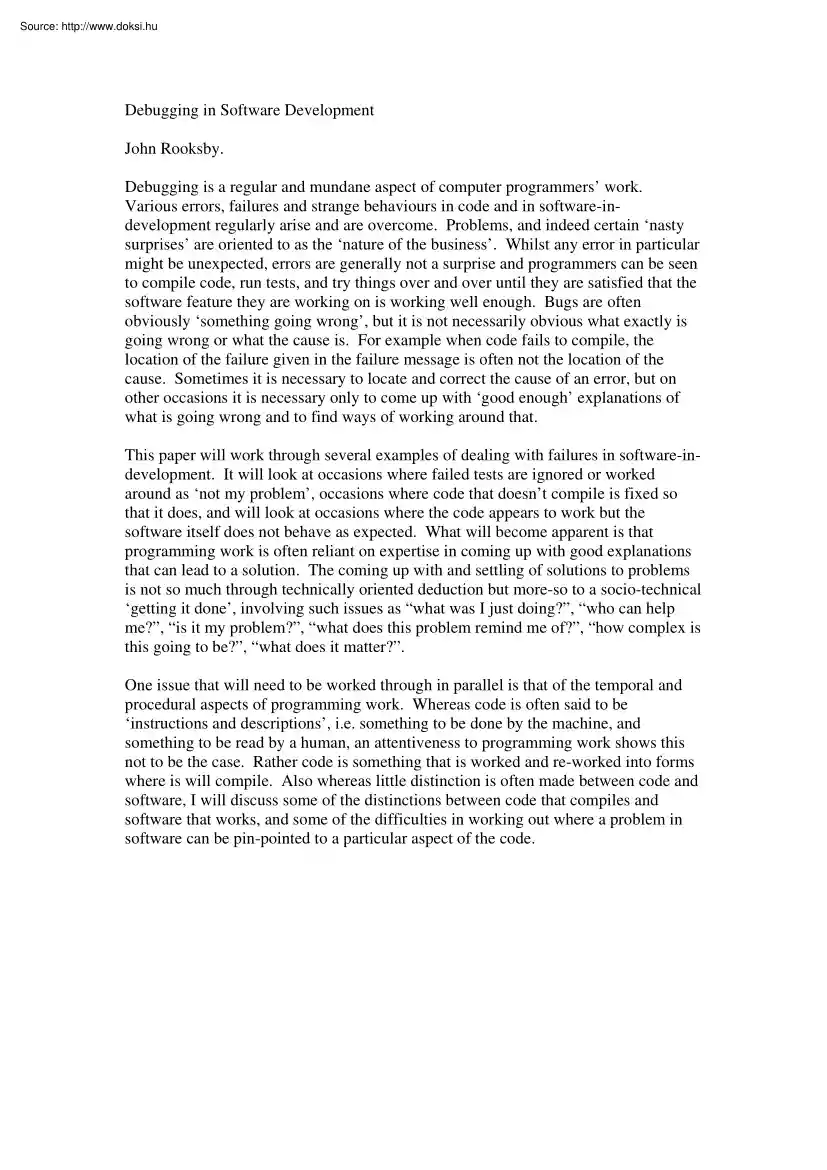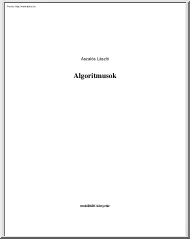Datasheet
Year, pagecount:2007, 1 page(s)
Language:English
Downloads:11
Uploaded:November 28, 2012
Size:9 KB
Institution:
-
Comments:
Attachment:-
Download in PDF:Please log in!
Comments
No comments yet. You can be the first!Most popular documents in this category
Content extract
Debugging in Software Development John Rooksby. Debugging is a regular and mundane aspect of computer programmers’ work. Various errors, failures and strange behaviours in code and in software-indevelopment regularly arise and are overcome. Problems, and indeed certain ‘nasty surprises’ are oriented to as the ‘nature of the business’. Whilst any error in particular might be unexpected, errors are generally not a surprise and programmers can be seen to compile code, run tests, and try things over and over until they are satisfied that the software feature they are working on is working well enough. Bugs are often obviously ‘something going wrong’, but it is not necessarily obvious what exactly is going wrong or what the cause is. For example when code fails to compile, the location of the failure given in the failure message is often not the location of the cause. Sometimes it is necessary to locate and correct the cause of an error, but on other occasions it is necessary
only to come up with ‘good enough’ explanations of what is going wrong and to find ways of working around that. This paper will work through several examples of dealing with failures in software-indevelopment. It will look at occasions where failed tests are ignored or worked around as ‘not my problem’, occasions where code that doesn’t compile is fixed so that it does, and will look at occasions where the code appears to work but the software itself does not behave as expected. What will become apparent is that programming work is often reliant on expertise in coming up with good explanations that can lead to a solution. The coming up with and settling of solutions to problems is not so much through technically oriented deduction but more-so to a socio-technical ‘getting it done’, involving such issues as “what was I just doing?”, “who can help me?”, “is it my problem?”, “what does this problem remind me of?”, “how complex is this going to be?”,
“what does it matter?”. One issue that will need to be worked through in parallel is that of the temporal and procedural aspects of programming work. Whereas code is often said to be ‘instructions and descriptions’, i.e something to be done by the machine, and something to be read by a human, an attentiveness to programming work shows this not to be the case. Rather code is something that is worked and re-worked into forms where is will compile. Also whereas little distinction is often made between code and software, I will discuss some of the distinctions between code that compiles and software that works, and some of the difficulties in working out where a problem in software can be pin-pointed to a particular aspect of the code
only to come up with ‘good enough’ explanations of what is going wrong and to find ways of working around that. This paper will work through several examples of dealing with failures in software-indevelopment. It will look at occasions where failed tests are ignored or worked around as ‘not my problem’, occasions where code that doesn’t compile is fixed so that it does, and will look at occasions where the code appears to work but the software itself does not behave as expected. What will become apparent is that programming work is often reliant on expertise in coming up with good explanations that can lead to a solution. The coming up with and settling of solutions to problems is not so much through technically oriented deduction but more-so to a socio-technical ‘getting it done’, involving such issues as “what was I just doing?”, “who can help me?”, “is it my problem?”, “what does this problem remind me of?”, “how complex is this going to be?”,
“what does it matter?”. One issue that will need to be worked through in parallel is that of the temporal and procedural aspects of programming work. Whereas code is often said to be ‘instructions and descriptions’, i.e something to be done by the machine, and something to be read by a human, an attentiveness to programming work shows this not to be the case. Rather code is something that is worked and re-worked into forms where is will compile. Also whereas little distinction is often made between code and software, I will discuss some of the distinctions between code that compiles and software that works, and some of the difficulties in working out where a problem in software can be pin-pointed to a particular aspect of the code





 When reading, most of us just let a story wash over us, getting lost in the world of the book rather than paying attention to the individual elements of the plot or writing. However, in English class, our teachers ask us to look at the mechanics of the writing.
When reading, most of us just let a story wash over us, getting lost in the world of the book rather than paying attention to the individual elements of the plot or writing. However, in English class, our teachers ask us to look at the mechanics of the writing.